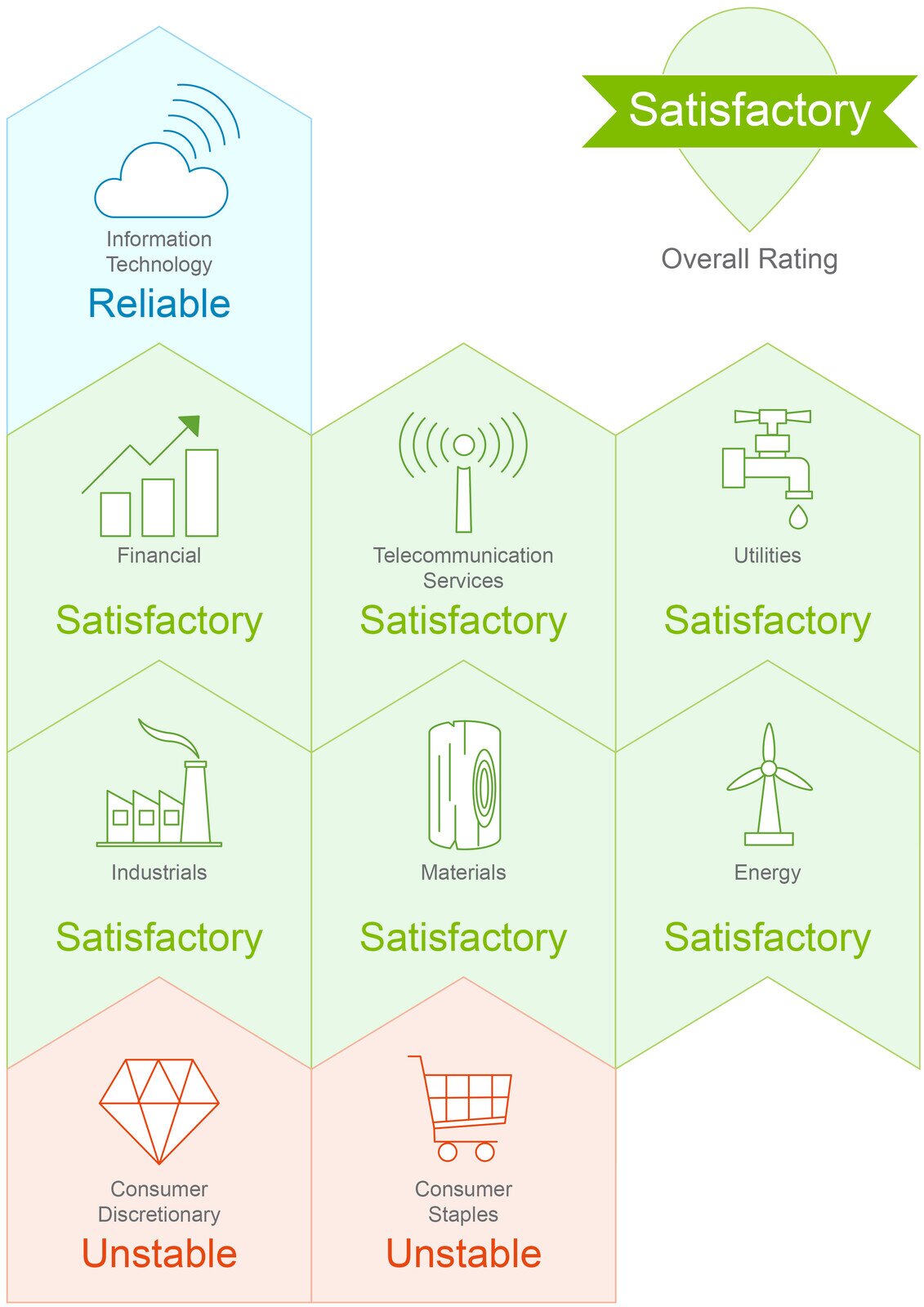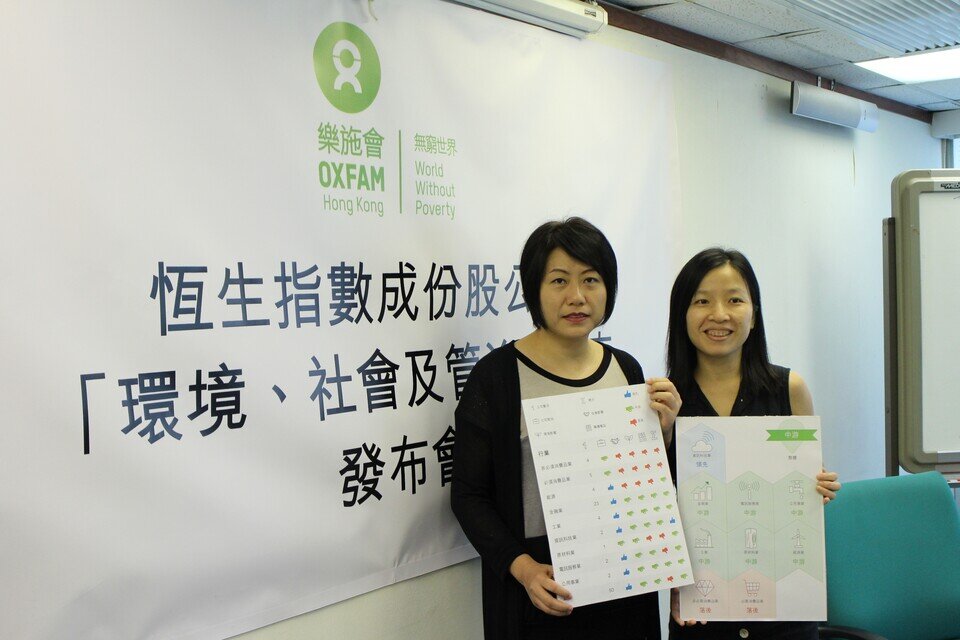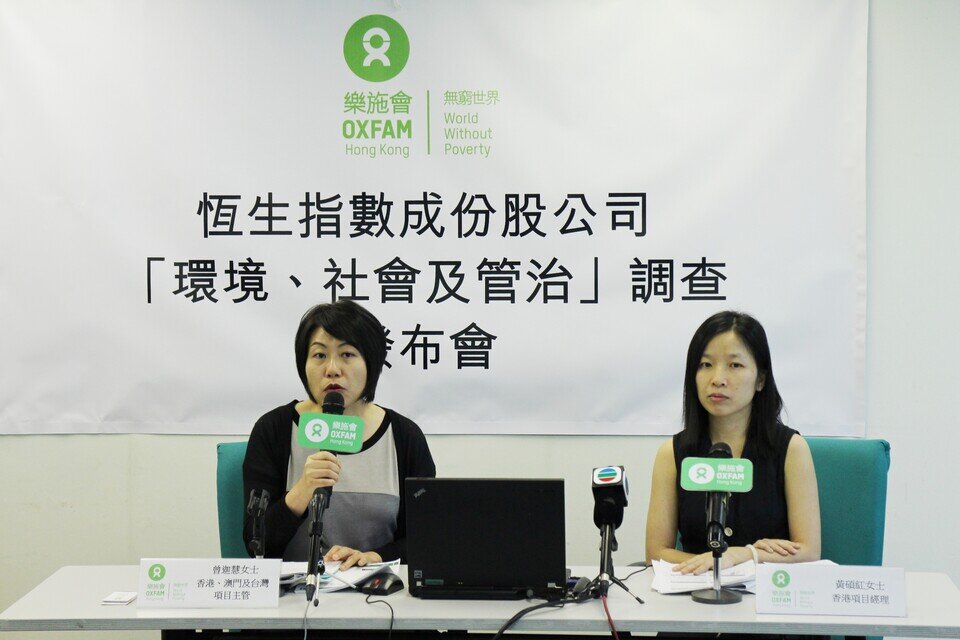21 JUN 2016
Blue Chip CSR Survey: Nearly a third of companies lag behind
Oxfam urges HKEx to improve disclosure standards
Oxfam published its ‘Survey on the Hang Seng Index (HSI) Constituents’ Environmental, Social and Governance (ESG)’ today, which reviews the 50 Hang Seng Index constituents’ ESG policies, practices and performance. It found that nearly a third of these companies lagged behind in these areas and fell in the ‘unstable’ category.
Through this survey, Oxfam aims to urge the private sector to enhance its ESG standards and integrate Corporate Social Responsibility (CSR) into its policies and operations. Oxfam believes companies should play a more active role in supporting the community at large and helping underprivileged people benefit from economic development as this would reduce poverty in the long run.
Research methodology and findings
Oxfam commissioned RepuTex to conduct a survey on HSI constituents’ ESG transparency and quality between October and December 2015. It reviewed 50 companies’ publicly available information (e.g. annual reports and sustainability reports) and invited them to complete a questionnaire to provide additional information to verify their performance; 19 companies provided additional information.
The survey covers four key areas in CSR: Environmental Impact, Social Impact, Corporate Governance and Workplace Practices. It was designed with reference to internationally recognised guidelines, including the Global Reporting Initiative (GRI) G4 Guidelines.
The survey found that of the 50 constituents, 32 per cent (16 companies) were in the ‘unstable’ category. A further 42 per cent (21 companies) fell into the ‘satisfactory’ category, while 26 per cent (13 companies) were classified as ‘reliable’. The top three performers were Swire Pacific Ltd, MTR Corporation, and HSBC Holdings, while Kunlun Energy Company, Belle International Holdings and Tingyi Cayman Islands Holding Corporation were in the bottom three.
The 16 companies in the ‘unstable’ category hired more than 1.4 million employees[1] around the world and have a total market capitalisation of HK$2700 billion. However, they failed to be socially responsible. For example, they did not protect employees’ rights, engaged in little to no dialogue with stakeholders regarding their social impact and did not formulate environmental policies or management systems.
Companies performed poorest in the areas of environmental impact and workplace practices. Forty-four per cent (22 companies) had not established environmental management systems in line with international standards, or set emissions reduction targets and timelines, while 48 per cent (24 companies) had not enforced equal employment opportunity policies. Next year, the HKEx will raise its environmental KPI reporting standards to ‘comply or explain’. However, the survey shows that the 50 HSI constituents did not perform well in the area, lacked transparency and urgently need improvement.
Regarding social impact, 32 per cent (16 companies) lacked stakeholder engagement procedures. Forty-four per cent of companies (22 companies) had not implemented policies to protect employees’ and human rights in their supply chains.
That said, companies performed the best in the area of corporate governance: 68 per cent (34 companies) fell into the ‘reliable’ category as it is mandatory to report on key issues regarding governance. This is somewhat indicative of the importance of enhancing standards in reporting, and the vital role authorities play in encouraging companies to improve.
Among the nine HSI sectors, the Information Technology sector outperformed all sectors, while both the consumer staples and consumer discretionary sectors performed the worst. These two sectors at the bottom hired more than 600,000 employees around the world and had a total market capitalisation of HK$720 billion, however, they failed to protect their workers’ employment rights. Since the consumer sector generally involves sizeable supply chains, a lack of company policies that protect supply chain workers’ livelihoods and human rights can have widespread ramifications.
Oxfam’s Recommendations
The HKEx should mandate ESG disclosure
CSR performance is clearly linked to regulation standards. Hong Kong Exchanges and Clearing Limited’s (HKEx’s) current Reporting Guide’s standards use a ‘comply or explain’ approach, which lags behind the international benchmark. As such, Oxfam recommends that the HKEx raise its standards by mandating companies to report on all key social performance indicators, matching international standards to require companies to adopt the GRI’s G4 Guidelines. The HKEx should also set a timeline indicating when it will shift from a ‘comply or explain’ approach to mandating ESG reporting for all companies.
Companies should adhere to international reporting standards
Oxfam recommends companies to publish stand-alone ESG reports according to international standards (e.g. the GRI G4 Guidelines). Both the consumer staples and consumer discretionary sectors should make a greater effort to improve their performance with regard to their social and environmental impact, and workplace practices. These two sectors should develop relevant policies to address ESG concerns, and release key non-financial information publicly so as to increase transparency.
Oxfam urges companies to:
- Openly support international human rights standards and become signatories; set up procedures and frameworks to prevent the violation of human rights in the workplace and extend them to supply chain partners.
- Develop policies to consult community stakeholders and respond to stakeholders’ demands publicly.
- Establish equal employment opportunity policies that recognise the rights of different groups and promote diversity in the workplace.
Investors and consumers should pay attention to companies’ CSR performance
Oxfam urges investors to consider ESG factors when making investment decisions. Companies with good CSR performance generally have better reputations, and can minimise financial, as well as social and environmental risks. Furthermore, consumers should monitor corporations’ production of goods and services to see whether they negatively impact society and the environment, or violate human rights in the process. Consumers should also demand for more ethical products and services.
- End -
About Oxfam
Oxfam is a worldwide development organisation that mobilises the power of people against poverty.
For media enquiries, please contact:
Wong Shek-hung
| Clara Law
|
[1] Calculated by summing up the total number of employees of each company; number of employees were derived from companies’ 2014 annual reports.
Among the nine HSI sectors, the Information Technology sector outperformed all sectors, while both the consumer staples and consumer discretionary sectors performed the worst.
Oxfam published its ‘Survey on the Hang Seng Index (HSI) Constituents’ Environmental, Social and Governance (ESG)’ today, which reviews the 50 Hang Seng Index constituents’ ESG policies, practices and performance. Kalina Tsang, Head of Oxfam’s Hong Kong, Macau, Taiwan Programme (left) and Wong Shek-hung, Oxfam’s Hong Kong Programme Manager (right) said nearly a third of these companies lagged behind in these areas and fell in the ‘unstable’ category.



